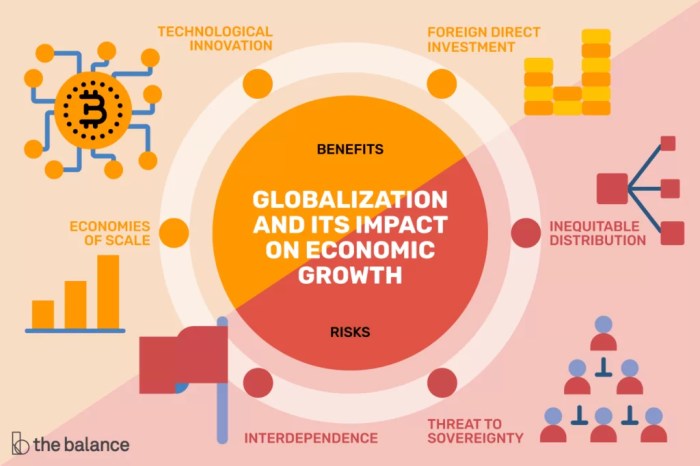Dive into the dynamic world of business as we explore the impact of the global economy on the business environment. From recent trends to currency fluctuations, get ready for an eye-opening journey!
Impact of Global Economy on Business Environment

The global economy plays a crucial role in shaping the business environment, influencing various aspects such as market demand, supply chains, and competition. Changes in the global economy can have a significant impact on businesses worldwide, leading to both opportunities and challenges.
Recent Global Economic Trends and their Impact
- One recent trend is the rise of protectionist policies and trade conflicts between major economies, such as the US-China trade war. This has disrupted global supply chains and increased uncertainty for businesses operating internationally.
- The COVID-19 pandemic has caused a global economic slowdown, affecting consumer demand, production, and investment. Many businesses have had to adapt to new ways of operating and face financial difficulties.
- The shift towards digitalization and e-commerce has accelerated due to the pandemic, presenting opportunities for businesses to reach new markets and streamline operations.
Role of International Trade Agreements
International trade agreements play a crucial role in shaping the business environment by reducing trade barriers, promoting economic cooperation, and providing a framework for international commerce. For example, agreements like the Trans-Pacific Partnership and the European Union promote trade liberalization and create a more predictable environment for businesses to operate in.
Currency Fluctuations and Business Operations
Currency fluctuations can significantly impact businesses operating in a global economy, affecting costs, pricing, and profits. For instance, a strong local currency can make exports more expensive for foreign buyers, while a weak currency can increase import costs. Businesses need to manage currency risk effectively to mitigate the impact of fluctuations on their operations.
Business Environment
The business environment refers to the surrounding conditions in which a business operates, including internal and external factors that can impact its operations and decision-making processes.
Components of the Business Environment
The business environment consists of both internal and external factors. Internal factors include the company’s employees, management, culture, and resources. External factors encompass economic conditions, political stability, technological advancements, social trends, and legal regulations.
- Economic Conditions: The economic environment includes factors such as inflation rates, interest rates, exchange rates, and economic growth, which can directly influence a business’s profitability and competitiveness.
- Political Stability: Political factors like government policies, regulations, and stability can significantly impact a business’s operations and investment decisions.
- Technological Advancements: The rapid pace of technological change can create opportunities for innovation and efficiency, but also pose challenges for businesses to adapt and stay competitive.
- Social Trends: Changing demographics, consumer preferences, and social values can shape market demand and impact how businesses interact with their customers.
- Legal Regulations: Laws and regulations at the local, national, and international levels can affect business operations, compliance requirements, and market access.
Importance of PESTEL Analysis in Understanding the Business Environment
PESTEL analysis is a strategic tool used by businesses to understand and analyze the key external factors that can impact their operations. By examining the political, economic, social, technological, environmental, and legal factors, businesses can identify opportunities and risks, anticipate changes in the business environment, and make informed decisions to mitigate potential threats.
Comparison between Developed and Developing Countries
The business environment in developed countries tends to be more stable, with well-established legal systems, infrastructure, and institutions that support business activities. On the other hand, developing countries may face greater challenges due to political instability, regulatory uncertainties, and infrastructure limitations. Businesses operating in developing countries often need to navigate a more volatile environment, adapt to changing market conditions, and manage risks associated with emerging economies.
Ending Remarks

As we conclude our exploration of the impact of the global economy on the business environment, remember that adaptability and insight are key in navigating this ever-evolving landscape. Stay informed, stay agile, and thrive in the world of business!
Questions and Answers
How do changes in the global economy affect businesses?
Changes in the global economy can impact businesses through factors like market demand, currency exchange rates, and trade policies.
What is the role of international trade agreements in shaping the business environment?
International trade agreements can influence business operations by opening up new markets, reducing tariffs, and establishing trade rules.
Why is PESTEL analysis important in understanding the business environment?
PESTEL analysis helps businesses assess the impact of political, economic, social, technological, environmental, and legal factors on their operations.
How does the business environment differ between developed and developing countries?
Developed countries usually have stable economies, established infrastructure, and mature markets, while developing countries may face challenges like political instability and limited access to resources.